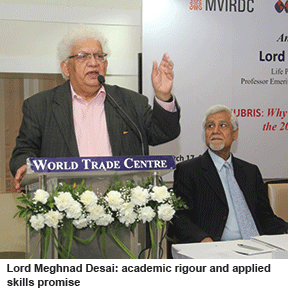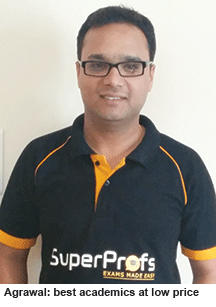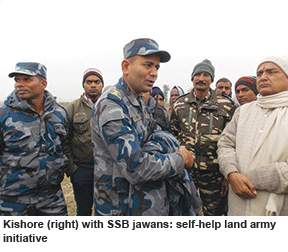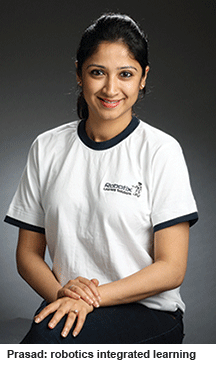 An emeritus professor at the London School of Economics and a highly-respected economist of Indian origin, Lord Meghnad Desai — a life peer of the House of Lords, the second chamber of the British parliament — is well-known in India as a television panelist and commentator popular for his forthright views on political and economic issues.
An emeritus professor at the London School of Economics and a highly-respected economist of Indian origin, Lord Meghnad Desai — a life peer of the House of Lords, the second chamber of the British parliament — is well-known in India as a television panelist and commentator popular for his forthright views on political and economic issues.
Newspeg. On March 17, Desai inaugurated the Meghnad Desai Academy of Economics (MDAE) in upscale south Mumbai. The academy is set to admit its first batch of 30 students in July.
The launch of MDAE, sited in the commercial capital’s 30-storey World Trade Centre in Cuffe Parade, was a big ticket event which attracted heavyweights of the finance and academic world. Among them: Dr. Ajit Ranade (head of the academic board of MDAE and chief economist of the Aditya Birla group of companies), Dr. Tushar Poddar (chief India economist and managing director of Goldman Sachs), Niranjan Rajadhyaksha (executive editor of Mint), Dr. Indu Shahani (vice chairperson of MDAE) and P.D. Singh (managing director of J.P. Morgan, India). The objective of the boutique academy is to “learn, think, apply and prepare students to take leadership positions in the global economy”.
History. Born in Vadodara, Gujarat, Desai is an alumnus of Ruia College, Mumbai, who was awarded a Masters in economics by Bombay University in 1960 and a doctorate scholarship by the University of Pennsylvania. He signed up with the London School of Economics in 1965 where he served as a professor of economics from 1983-2003, and was appointed a Labour Party peer of the realm in 1991.
Following his long stint in academia, Desai has authored several highly acclaimed books including Rethinking Islamism: Ideology of the New Terror (2006), The Route to All Evil: The Political Economy of Ezra Pound (2007), Dead on Time (2009), The Rediscovery of India (2009) and his latest Hubris: Why Economists Failed to Predict the Crisis and How to Avoid the Next One (2015).
Direct talk. “MDAE has been designed as a postgraduate institution of excellence which will infuse students with the academic rigour and applied skills to meet the needs of the globalised workplace. Our pedagogy will marry theory with real-world practice and equip students with sophisticated economics and finance know-how when they enter the workforce,” says Desai.
Future plans. According to MDAE spokespersons, the academy is designed as an exclusive boutique institution which will admit high-quality economics and finance graduates (tuition: Rs.2.25 lakh for the 11 month programme). They will be mentored by well-reputed domestic and foreign faculty handpicked from MIT (USA), LSE and Warwick University (UK). “The alumni of MDAE are sure to be brilliant, and I look forward to their shaping the future of economics in India and worldwide,” says Desai.
Way to go!
Shweta Nair (Mumbai)
Brummie Indophile
Sir David Eastwood is vice chancellor of the University of Birmingham (UoB, estb. 1900), ranked among the Top 100 worldwide by reputed London-based rating agencies Quacquarelli Symonds and Times Higher Education. A highly-respected academic with over 32 years’ experience in UK’s higher ed establishment, Prof. Eastwood is also chair of the Russell Group (association of 24 leading British research universities) and board member of Universities UK and the Arts and Humanities Research Council. 
Newpeg. Prof. Eastwood was in Delhi late last year with a top-level delegation to explore ways and means to deepen Birmingham University’s engagement with institutions of higher education in India. The delegation included London-based Indian-origin business tycoon Lord Karan Bilimoria, founder of the popular Cobra beer brand who was appointed chancellor of UoB last year.
Direct talk. “UoB is committed to establishing meaningful partnerships with Indian institutions. We were one of the first British universities to set up a regional office in India in 2009. During our recent visit, we explored research partnerships with Panjab University, one of the top-ranked higher education institutions in India and the potential for enhanced collaboration between UoB’s Railway Institute, Delhi Technological University and the Delhi Metro Rail Corporation,” says Eastwood, an alumnus of Oxford University who served as chief executive of the Higher Education Funding Council for England, and as vice chancellor of the universities of Wales (Swansea) and East Anglia, prior to being appointed VC of UoB in 2009.
History. UoB’s connection with India spans over a century. The university welcomed its first Indian students in 1909, and since then it has provided high quality undergrad and postgraduate education to more than 1,300 Indian students, including the well-known Kannada and English author Dr. U.R. Ananthamurthy, former cabinet secretary Ajit Kumar Seth and Dr. Alwyn Didar Singh, secretary general of FICCI. Currently, the university has 32,000 students including 4,000 international students from 150 countries on its muster rolls.
According to Eastwood, UoB is already involved in several high potential academic and research partnerships with the Public Health Foundation of India to study the salt intake of Indian adults; a joint project with Yale and Delhi universities to develop a global justice programme, and with the Indian Institute of Science, Bangalore to research tuberculosis cures. Moreover, faculty of UoB’s schools of physics and astronomy are collaborating with the Indian Institute of Science Education and Research, Pune in the field of ultracold atoms.
Future plans. “We want to build mutually beneficial long-term academics-to-academics engagements, and key institutional partnerships in India. This will lead to increased student and faculty mobility, education innovation, teaching partnerships, and enhanced research collaboration,” says Eastwood.
Fair winds!
Autar Nehru (Delhi)
Online lectures aggregator
 PIYUSH AGRAWAL is founder-CEO of the Bangalore-based Aurus Network Infotech Pvt. Ltd (estb. 2010), which in 2014 launched its flagship SuperProfs.com, an online portal providing live and recorded lectures of India’s best professors in HD-quality at low internet speeds (100 kbps), to prepare students for competitive entrance exams such as IIT-JEE, GATE among others.
PIYUSH AGRAWAL is founder-CEO of the Bangalore-based Aurus Network Infotech Pvt. Ltd (estb. 2010), which in 2014 launched its flagship SuperProfs.com, an online portal providing live and recorded lectures of India’s best professors in HD-quality at low internet speeds (100 kbps), to prepare students for competitive entrance exams such as IIT-JEE, GATE among others.
Newspeg. On April 10, a free mobile app of SuperProfs.com was launched in Bangalore on a pilot basis. The app allows all internet users free access to 20 percent of SuperProfs.com’s best tests preparatory content.
History. A computer science engineering postgrad of IIT-Kanpur, which awarded him the Cadence gold medal for the Best Master’s thesis across all engineering departments, Agrawal enroled in a Master’s programme at Stanford University, USA but dropped out midway and returned to India to promote Aurus Network five years ago.
Direct talk. “SuperProfs.com works on a revenue sharing basis with professors. We choose the best lectures of eminent professors to help students, especially in Tier II and Tier III cities and small towns preparing for IIT-JEE, chartered accountancy, company secretary exams, GATE, etc” says Agrawal.
“If students are impressed by our free content, they can sign up for monthly, quarterly, half-yearly or annual online lectures in chartered accountancy (Rs.1,999 per month) and IIT-JEE (Rs.2,900 per month). The revenue we earn from enrolments in test prep programmes is shared with our professors. Currently, 75,000 students in 231 cities countrywide are accessing lectures of our panel of 250 professors. The USP of SuperProfs.com is that students can access lectures of the country’s best academics at a fraction of the tuition fees charged by coaching institutes,” explains Agrawal.
Future plans. Encouraged by the enthusiastic response from students and academics countrywide, the company plans to expand the number of its online test preparatory programmes from around five to ten over the next two years with online test prep classes/lectures for the Union Public Service Commission (UPSC) exams starting from June.
“The future of education is digital as people become familiar with online teaching and technologies. I am quite confident that SuperProfs.com will become a familiar name within the students’ community in the next three years,” predicts Agrawal.
Right on!
Balasubramaniam K (Bangalore)
Activist professor
An alumnus of B.R. Ambedkar (BRA) University, Muzaffarpur (Bihar) and former faculty of Tilka Manjhi Bhagalpur University, Prof. Anand Kishore has been teaching economics at SLK College, Sitamarhi (pop.1.4 million), an institution affiliated with BRA University, since 1998. With just six teachers against a sanctioned strength of 35, the academic environment in SLK College is nothing to write home about with the college’s six teachers tasked with teaching nearly 4,000 students. Despite this onerous workload, Kishore makes time to guide youth, support farmers’ rights and carry out the duties of district coordinator of PUCL (People’s Union for Civil Liberties). 
Newspeg. Recently, Prof. Kishore has been in the media limelight for leading a people’s movement in Sitamarhi district to set right the course of River Lakhandei, which strayed from its course eight years ago following a flood. The river originates in the Shivalik hills of Nepal and has been the lifeline of farmers in the district where it flows for nearly 36 km. Engineers of the state government water resources and irrigation ministry say the task of digging up a blocked 1-km stretch of the river is unfeasible.
After months of public debate, on December 24 last year, residents of Sonbarsha village near the Indo-Nepal border began digging the stretch themselves.
Although initially national security agencies such as the Sashastra Seema Bal (SSB), deployed on the Indo-Nepal border, and the Nepal police across the border raised objections to this land army because Sitamarhi is in the grip of a Maoist insurgency, Kishore has convinced security officials and the state and local governments that the self-help farmers’ movement is no threat and entirely in the public interest.
Direct talk. “As an educated person and teacher, I feel responsibile towards the people here who are not only poor and uneducated, but are at the receiving end of an indifferent administration. Because of this I remain accessible to the poor, farmers, villagers etc for a cause that has a bearing on all of us. The administration should have executed the project before the people took it upon themselves. Thousands of farmers have been adversely affected due to poor water flow in the river. Though the task ahead is challenging, we will see it through,” says Kishore.
Future plans. Led by Prof. Kishore, Bihar’s new land army intends to dig up the blocked stretch of 1 km before July, in time to receive the monsoon rains. “SSB and Nepali officers are appreciative of our work and have promised to help our endeavour once they receive clear instructions from their superiors,” he says.
Power to you, Professor!
Arun K. Shrivastav (Patna)
Robotics education driver
 Agraduate of Indian Law Society (ILS), Pune and Lee Kuan Yew (LKY) School of Public Policy, National University of Singapore (NUS), Aditi Prasad is the chief operating officer of Robotix Learning Solutions Pvt. Ltd (RLS), founded by her father Ramana Prasad (an engineering alumnus of IIT-Madras and University of Cincinnati, USA) in 2009. Aditi joined RLS in 2012 and currently leads operations of the company’s robotics education programmes, robotics events, social initiatives and product strategy with the prime objective of enabling hands-on learning using robots.
Agraduate of Indian Law Society (ILS), Pune and Lee Kuan Yew (LKY) School of Public Policy, National University of Singapore (NUS), Aditi Prasad is the chief operating officer of Robotix Learning Solutions Pvt. Ltd (RLS), founded by her father Ramana Prasad (an engineering alumnus of IIT-Madras and University of Cincinnati, USA) in 2009. Aditi joined RLS in 2012 and currently leads operations of the company’s robotics education programmes, robotics events, social initiatives and product strategy with the prime objective of enabling hands-on learning using robots.
Newspeg. Last December, RSL hosted a three-day annual event — the Indian Robotix League (IRL) 2014 — which featured eight unique robotics competitions in which 340 teams comprising 900 college and class IV-XI students from across the country participated. Moreover, as part of its social initiatives programme, RSL launched the Indian Girls Code to offer free-of-charge coding and robotics programmes to rural orphan girls from class IV onwards, under which the first batch of 25 girls from Annai Ashram, Tiruchirappalli completed their training last February.
Direct talk. “Robotics is a joyous way for school students to learn STEM (science, technology, engineering and maths) subjects. Our programme is based on an international syllabus to encourage children to generate new ideas for real world applications and integrates robotics into the K-12 STEM curriculum of schools, with our master trainers training teachers. Our objective is to inspire students to become scientists and innovators, and our pedagogies and projects are designed to stimulate their creativity, analytical thinking and problem-solving skills which are essential in the 21st century,” says Aditi.
History. After graduating from NUS in 2011, Aditi worked for six months at the LKY School, Singapore before returning to India in 2011. She then served as project associate in the China Studies Centre of IIT-Madras for a year before joining RLS in 2012. Since then, she has been leading the robotics education programmes of the company which include an in-school robotics course for children (classes IV-XI) and an after-school programme (30 weeks) for students of classes IV-VIII offered at the company’s three centres in Chennai.
Future plans. RSL has chalked out ambitious plans for the future. “We plan to launch new robotix education products this summer; collaborate with schools to integrate robotics in their curriculums and establish three more centres in Chennai for our after-school and summer camp programmes. We now want to offer brain gym programmes in early childhood education,” says Aditi enthusiastically.
Wind in your sails!
Hemalatha Raghupathi (Chennai)